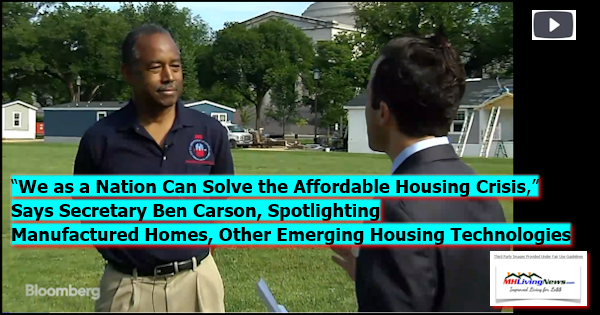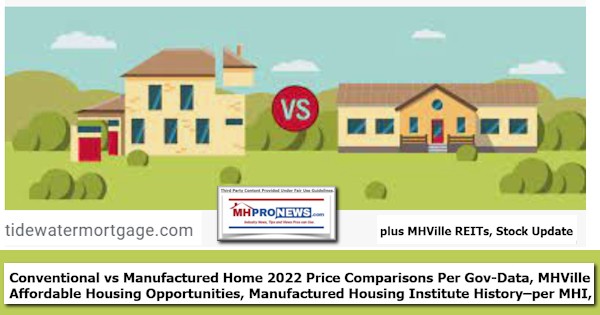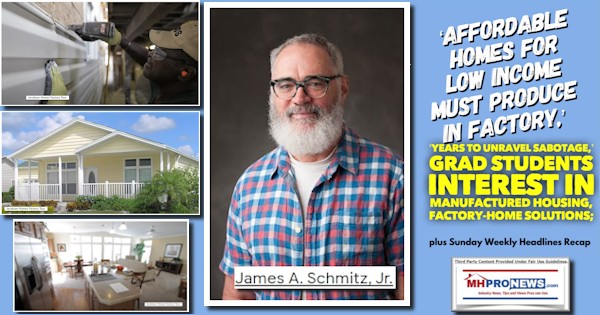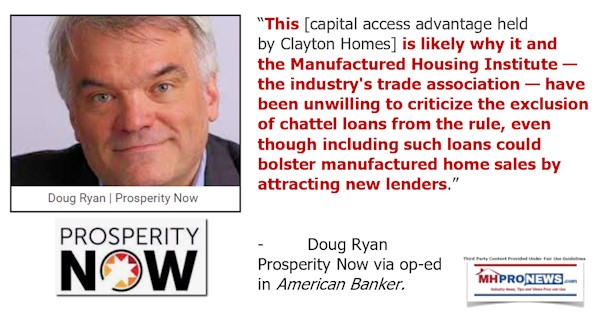The article by Jeff Somers about the “The Pros and Cons of Buying a Manufactured Home” being fact-checked here on Mobile and Manufactured Home Living News (MHLivingNews) below is found on the Lifehacker website. Lifehacker’s tag line proclaims: “Do everything better” – which is certainly a noble goal. Lifehacker indicates that they are part of a ‘family’ of about a dozen website brands under the G/O Media name that includes Quartz whose motto states they “Make Business Better.” Somers’ post on manufactured homes is under 1200 words. It has several positives but apparently also weaknesses and misstatements. Weaknesses aside, Somer’s theme is an important one. His post is better than numbers of outsiders looking into MHVille (the world of manufactured housing) normally produce. As a goal on MHLivingNews is to convey accurate and actionable information for those seeking affordable housing options and related lifestyle insights, this fact-check and analysis explores the good in Somers’ article while also probing and explaining his apparent misses. The financially marginal to millionaires and even billionaires are among the estimated 22 million Americans who have chosen mobile or manufactured home living. That makes modern manufactured home option the most proven form of permanent affordable housing in America.
Between Somers’ remarks below and this fact-check/analysis, those seeking information on this often-misunderstood housing option either for themselves and/or for others – can gain evidence-based takeaways in just minutes.
Note that Somers’ website makes it clear that he is a popular, good, and prolific writer.
That said, there is no obvious indication that Somers has any personal expertise in factory-built housing in general or manufactured home arena more specifically.
With that introduction, the bulk of his article (the complete text sans the featured image, which should never be used with a manufactured home report; or their cross-links to ‘related’ topics) will be provided under fair use guidelines for such fact-checks and basic fisking. In Somers’ text below where the reader sees yellow highlighting (added by MHLivingNews) those areas are specifically examined to correct errors or refine a claim.
The Pros and Cons of Buying a Manufactured Home
Manufactured homes are typically much cheaper than traditionally-constructed homes. But there are some downsides.
By Jeff Somers
Published Wednesday November 16, 2022.

All of that means buying a traditional home is an expensive option right now. The median price for an existing single family home is currently close to $400,000, while the median price of new construction is around $450,000. For many people—even people who thought they were ready just a short time ago—buying a house is impossible right now.
There is one option that might make entering the housing market a possibility even if you’ve been priced out of traditional homes, however: Manufactured homes.
Most houses are built on-site, with construction crews, equipment, and materials brought in. Manufactured homes are built in a factory, either as a single unit or as modular pieces, and shipped whole (or in large pieces) to the land where they will sit. If you’ve ever been on the highway and seen a truck hauling what looked like an entire ranch house on a flatbed with an OVERSIZE LOAD sign, that was a manufactured house being delivered.
These homes used to be called mobile homes, and prior to modern manufacturing processes, they earned their poor reputations. Modern manufactured homes aren’t really meant to be moved more than once, however, and quality has risen—all manufactured homes built after 1976 have to adhere to some strict quality standards. These days a manufactured home is a legitimate option for anyone looking to buy a house. In fact, buying a manufactured home as opposed to a traditionally-built home comes with a few serious benefits—and a few serious downsides.
Upside: Cost
The number one reason to consider a manufactured home is cost. The average cost of a manufactured home is just $128,000. Depending on where you live, that’s very likely orders of magnitude cheaper than a site-built home. Just like a lot of new-build homes in developments, you can typically add on a slew of upgrades to your manufactured home, but even if you splash out and get the largest and most glamorous manufactured home you can find, the price is unlikely to get much higher than $250,000. That’s significantly cheaper than traditionally-built homes.
Downside: Finding land to put it on
On the other hand, once you have your beautiful dream home built in the factory, you have to put it somewhere. Part of the cost of a traditional home sale is the land the house sits on. With a manufactured house that’s a separate transaction, so you’ll have to locate a plot of land you can acquire (through purchase or as a gift), get all the permits and legal paperwork done, run utility and water lines to it, and have a foundation created if you want the home to be permanent.
You can rent land for your home, too—while manufactured homes aren’t meant to be moved around constantly, they can be moved if necessary, so it’s possible to rent space in an area that caters to manufactured homes and have your home placed there. The downside is that you’ll have to pay rent and other costs, and your home’s value may depreciate because it’s not linked to the land under it.
Upside: You can move them (sometimes)
Still, the fact that your home can be moved (as long as you haven’t permanently affixed it to a foundation) is an upside. If you need to relocate to a whole new area, you might not need to sell a house you enjoy living in and have customized to your needs. While packing up an entire house and moving it can be a complex and expensive operation, it will likely be less expensive than buying a new home, and you won’t need to worry about decluttering the place for real estate photos.
Downside: Tougher to finance
If your manufactured home isn’t affixed to a permanent foundation, getting financing for it can be a lot more difficult than getting a traditional mortgage. If it is permanent, and it’s at least 400 square feet, you can probably get a traditional mortgage—otherwise you’ll have to explore a few other options:
- Federal loans. The government offers several loans that can be used for manufactured homes. MH Advantage only applies to certain manufactured homes, but usually requires a down payment of as little as 3%. The CHOICEHome program is an option if you’re using your manufactured home as a primary or secondary residence; this federal loan requires just 5% down. And the Federal Housing Administration (FHA) offers Title I loans that can be used for these homes.
- Chattel loan. If your manufactured home isn’t on a permanent foundation or otherwise doesn’t qualify for one of the loans above, you’ll have to get something like a chattel loan, which is very similar to the loan you take out to buy a car.
- Dealer financing. Some manufactured home companies offer their own financing. These are most likely chattel loans, and as with car loans you should shop around for a better rate if that’s the option you’re going with—but nothing beats dealer financing for convenience.
A final consideration is that manufactured homes that aren’t permanently affixed to a foundation on land you own will tend to depreciate in value, much like a car. That means you might not have much equity in yours, even after you pay off your loan.
Upside: Energy efficiency
Construction of manufactured homes takes advantage of a factory setting and a replicable design and process, resulting in less construction waste. They can also be built to high standards when it comes to energy efficiency. Many manufactured homes are even Energy Star-rated. All this means that you’ll save money on heating and cooling costs, and since these homes tend to be more affordable in the first place, you’ll have more budget runway to upgrade the energy efficient aspects of your house.
Downside: Limited choices
Manufactured homes may offer fewer options than traditionally-constructed homes. Similar to buying a home from a developer, you may have a limited menu of design choices and features you can choose from, because the home is being built in a factory from a plan, not custom designed for you.
Then, once you have your home, you may run into zoning limitations concerning where you can set it up. This sometimes means only being able to place the home in certain areas, or it might require you to purchase more land than you want—or you might find your only choice is to rent a lot in a designated park area. This could significantly impact the “dream” part of owning your dream home. ##
Additional Factual Information with More MHLivingNews Analysis, Commentary and Linked Resources
Articles like this one by Somers have been published by various writers and researchers for well over twenty years. The need for affordable housing in the U.S. is tremendous. Estimates for the number of new homes that need to be built to meet demand estimated to range from some 3.8 million dwellings required to well over 8 million residential units, depending on the source. That tremendous need perhaps explains why the topic of how factory-crafted manufactured homes comes up periodically.
What oddly escapes some who are just doing a quick ‘one and done’ type of article on manufactured housing is this. If manufactured homes are such a good option – and there is plenty of research that demonstrates that they are – then why are this type of off-site or factory-based home building so misunderstood? Why are there several hurdles to manufactured housing acceptance, as evidenced by zoning or financing topics raised by Somers? Why is the industry performing at only about 30 percent of the production pace today than it did in 1998? Those questions are not meant to be slams on manufactured housing. Rather, they are logical reasons to dig deeper into causes and effects in an obviously misunderstood subject. Hold those thoughts, while this article briefly examines some misses by Somers’ Lifehacker post.
After noting that manufactured homes are considerably lower in cost than conventional housing, Somers mistakenly said this: they “tend to depreciate in value…”
That is a common misconception. MHLivingNews and our MHProNews sister site has several articles that on this topic that point to their respective facts, evidence, and research sources. For instance, the Federal Housing Finance Agency (FHFA) said in 2018 that their data demonstrated that manufactured homes are overall appreciating in value. in the 4th quarter of 2021 LendingTree released their study comparing manufactured home appreciation to that of conventional housing. LendingTree’s research stated that in dozens of states, manufactured homes were appreciating faster than conventional housing.

Prior HUD Secretary Ben Carson also cited data that indicated that manufactured homes were ready to come into their own because they were an opportunity for generational wealth creation, precisely because they appreciated in value and were durable by design – he said ‘resilient’ – even during tornadoes and hurricanes. Carson pledged that HUD would work with the manufactured home industry to meet that potential and initiated the Innovative Housing Showcase (IHS) in 2019 to kick off that effort.



MHLivingNews periodically updates the collection linked below of the “Ultimate” manufactured housing research reports. These date back decades, but many are from the 21st century. Those reports routinely debunk the common ‘fears’ about manufactured homes. They are from what should be reputable sources, such as the National Association of Realtors (NAR), various university studies, and federal research, among others.
Somers’ cited the Manufactured Housing Institute (MHI) zoning commentary. In fairness, for someone doing a rapid research report on the topic, MHI may appear to be an obvious pick. But an objective researcher should see what the contrarian views are too. That noted, why wasn’t the Manufactured Housing Association for Regulatory Reform (MHARR) cited by Somers?
- No other source online has maintained an easy-to-access public database of monthly manufactured home production statistics for as long as MHARR has done.
- MHARR produces manufactured home specific news reports,
- issues and perspectives,
- Q&A’s with a 5-decade veteran of manufactured housing that probe key topics facing the industry,
- along with white papers. Those features and others explain more precisely what the headwinds are for the manufactured home industry, be they regulatory, zoning, financing, internal or external roadblocks, or whatever.
That noted, consider the following collage/infographic for a few moments. It happens to support the positive takeaways from Somers’. But it also helps explain the terminology (which Somers did better than some, but which could have been better), while also pointing to supporting third-party researchers as well as manufactured home industry sources.

MHLivingNews recently probed a report published by USA Today on the affordable housing crisis. It makes the point that younger American hopefuls that yearn for home ownership or more affordable living are getting frustrated with the politics of housing. That’s an important takeaway, even though USA Today arguably had some misses too.
Two HUD Policy Development and Reseach (PD&R) work product is explored in the item linked below. Those two HUD researchers, Pamela Blumenthal and Regina Gray, said that both major parties have been promising improvements in affordable housing for some 50 years. Blumenthal and Gray said the causes and cures to the affordable housing crisis are known. MHLivingNews elaborated on their points with additional evidence that brought ought the manufactured home solution that Congress enacted over 20 years ago.
Why is manufactured housing underperforming during an affordable housing crisis? James A. “Jim” Schmitz, Jr. and some of his Minneapolis Federal Reserve colleagues and other economists have probed the question of why manufactured housing was underperforming. Their interim conclusion in their ongoing work is that monopolists (oligopoly style monopolization) have manipulated the system in their own favor to subvert or “sabotage” manufactured housing. While their terminology merits tweaking, their arguments and evidence are compelling.

The above commentary and analysis to this point is about 1200 words. That MHLivingNews analysis added to the nearly 1200 from Somers’ observations and remarks begins to paint a more robust picture of the pros about manufactured housing that also shed light on the roadblocks or “cons.” The facts and applied common sense illustrate the potential for manufactured housing to be a strong alternative to conventional housing for those who want or need more affordable living. MHLivingNews periodically mentions ‘the rich and famous’ who own a manufactured home. If they can handle ‘the stigma’ and think it is a good option, then clearly it is a good option for tens of millions of others too.



Perhaps the most problematic part of Somers’ article is on financing. It is true that there are fewer lenders in manufactured housing than for conventional housing. But right or wrong, there are also tens of millions of fewer manufactured homes than conventional houses. Additionally, his segment on “federal loans” has incorrect and perhaps accidentally misleading information.
Somers mentions MH Advantage and CHOICEhomes. Those are the respective brands names for Fannie Mae and Freddie Mac’s version of the lending that supports the MHI trademarked CrossmodTM homes.
Fannie and Freddie are private corporations that are federally regulated, so they are not ‘federal’ loans.
Crossmods are a specialized topic explored through the lens of the Modular Home Builders Association (MHBA) executive director Tom Hardiman’s remarks found at the link below. Suffice it to say for the purpose of this fact-check of Somers post that only a tiny fraction of HUD Code manufactured homes are so-called Crossmods.
That said, there are several ways to finance a manufactured home in land-home (mortgage) financing via conventional, FHA Title II, VA, Rural Development (“USDA”) lending, among others.

Then, there are numbers of local, regional and national lenders or credit unions that make “home only” financing for manufactured homes.
Somers mentioning FHA Title I in that home only lending context sadly only reveals he doesn’t fully understand the nuances of the various issues. MHI said only some three (3) FHA Title I loans were made in a recent year. That’s a dramatic fall from what used to be a strong loan program supporting the more affordable purchase of HUD Code manufactured homes. MHARR’s Mark Weiss provides even more details.

Those points made; Somers’ headline is quite right. There are pros and cons to manufactured homes – or almost everything – that someone might care to consider. A fairly modest number of tweaks could make his article far more useful to consumers by making it more accurate.
What Somers didn’t explore, or mention, is that Congress passed manufactured home specific legislation that passed by a widely bipartisan vote. Among those was the Manufactured Housing Improvement Act of 2000 (MHIA). The MHIA examined the zoning and placement issues Somers mentioned. The MHIA created a more robust authority for HUD to federally preempt local zoning barriers that unjustly barred the placement of contemporary HUD Code manufactured homes.
This “enhanced preemption” and its implications also merits a separate and more detailed look. Why? Because the solution to the affordable housing crisis is hiding in plain sight. The Congress made the possible over 20 years ago. To learn more, see the linked report below.
To wrap this up, Somers did a better than average job in terminology.
He did a better than average job on other aspects of his well-written post.
But the errors, misleading information, and misses in his article if they were corrected and more accurately presented could over time be part of the solution in making modern manufactured housing more accessible to millions of Americans who want or need affordability.
The federal laws needed to advance manufactured housing already exist. That’s something Somers either didn’t know or didn’t mention. To be fair, that article he linked on the MHI website fails to clearly make that point, nor does it mention enhanced preemption under the MHIA. But MHI is aware of it, as these quoted remarks below from MHI’s CEO make clear. That begs the question, why does MHI miss doing what could help the industry grow?

The ‘cons’ to manufactured housing have ironically been addressed numbers of times by third-party researchers and experts alike.
The pros to manufactured homes have been explored by Congress and others which led to favorable legislation that is sadly not being properly implemented.
Until more in mainstream media, along with public officials, are willing to dig deeper into the controversies and expose the forces lurking in the background and their motivations, manufactured housing will remain a positive yet artificially limited option that needs to be unshackled.
Less money on taxes to support affordable housing programs could result if good federal laws were robustly enforced. Meanwhile, millions of more Americans could be enjoying the wealth-building capacity of affordable manufactured housing. Conventional housing resale values, per research, would also not be harmed by the more robust use of modern manufactured homes.
There are numerous possible benefits to having more manufactured homes. On that happy note that dovetails with the “pros” portion of Somers’ thesis, let’s call it a day on this fact check and analysis. ###

We recommend that news tips NOT use company, nonprofit or organizational emails or cell phones. To report a news tip, click the image above or send an email to iReportMHNewsTips@mhmsm.com – To help us spot your message in our volume of email, please put the words NEWS TIP or COMMENTS in the subject line.
That’s a wrap on this installment of “News through the lens of manufactured homes and factory-built housing” © where “We Provide, You Decide.” © ## (Affordable housing, manufactured homes, reports, fact-checks, analysis, and commentary. Third-party images or content are provided under fair use guidelines for media.) (See Related Reports, further below. Text/image boxes often are hot-linked to other reports that can be access by clicking on them.)

By L.A. “Tony” Kovach – for MHLivingNews.com.
Tony earned a journalism scholarship and earned numerous awards in history and in manufactured housing. For example, he earned the prestigious Lottinville Award in history from the University of Oklahoma, where he studied history and business management. He’s a managing member and co-founder of LifeStyle Factory Homes, LLC, the parent company to MHProNews, and MHLivingNews.com. This article reflects the LLC’s and/or the writer’s position, and may or may not reflect the views of sponsors or supporters.
Connect on LinkedIn: http://www.linkedin.com/in/latonykovach
Recent and Related Reports:
The text/image boxes below are linked to other reports, which can be accessed by clicking on them.
Lifestyles of the Rich and Frugal: Manufactured Mansions Take Their Place in the California Sun
 manufacturedhomelivingnews.com Manufactured Home Living News
manufacturedhomelivingnews.com Manufactured Home Living News




































